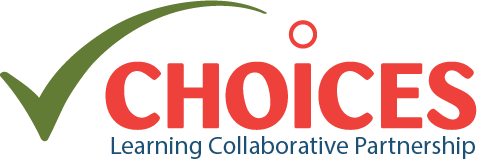
About
The CHOICES Learning Collaborative Partnership (LCP) was offered from 2015 – 2020 as an opportunity for health agencies to create new evidence to inform decision-making. This training, technical assistance, and modeling initiative was designed to build capacity among state and local decision-makers to understand and use cost-effectiveness analysis to identify childhood obesity prevention strategies that offer the best value for money.
Key Activities & Components
Training & Technical Assistance
The LCP operated over a 12-month project period during which the CHOICES team facilitated a series of in-person and virtual learning collaborative and technical assistance sessions that brought together state and local partners to develop skills in understanding and using cost-effectiveness analysis and to share experiences related to developing and communicating CHOICES models and results.
With support from the CHOICES team, LCP teams selected strategies from a list of 30 effective interventions that have the best available evidence for impact on dietary intake, physical activity, and/or excess weight and include a range of ages, settings, and sectors, including: school, early care and out-of-school time, clinical, and community.
Projecting Local Impact on Health & Costs
The CHOICES team worked with the partner teams to identify local data to ensure that modeling results reflected the local population including current health-related behaviors and obesity-related health status as well as the actual resources, activities, and costs that would be associated with local implementation of potential interventions.
The CHOICES team then used the CHOICES microsimulation model to predict the intervention’s impact on population health, population reach, implementation cost, health care cost savings, and potential impact on reducing health disparities over 10 years.
Communicating Findings to Inform Decision-Making
The CHOICES team provided technical assistance, resources, and tools to support communication of the project findings so that LCP teams could best use their results to inform local decision-making and next steps.
Benefits to Local Partners
Through the CHOICES LCP process, state and local health agency teams built capacity to understand and use cost-effectiveness analysis to identify childhood obesity prevention strategies that offer the best value for money. This partnership process helped to inform resource investment and cultivate alliances and support for childhood obesity prevention planning. By participating in this partnership, health agencies and their relevant partners received training and technical assistance on how to identify necessary data for a cost-effectiveness analysis, and how to interpret and communicate results to evaluate strategies to promote healthy weight. Many partners reported that this process provided a structured format for engaging other local partners (like local education or early care agencies or community-based organizations) who could be key partners in future implementation and/or communications activities.
Our Partners
The CHOICES LCP included staff and leaders from public health agencies and members of local key partner teams from selected states, counties, and cities. Additional collaborators included partners from the Association of State and Territorial Health Officials (ASTHO), the National Association of County and City Health Officials (NACCHO), and Big Cities Health Coalition (BCHC) who provided strategic counsel and helped convene health agencies through their existing networks of members and collaborators.
Learning Collaborative Partners included:
-
-
- Washington State Department of Health
- West Virginia Department of Health and Human Resources
- Mississippi State Department of Health
- Alaska Department of Health and Social Services
- New Hampshire Department of Health and Human Services
- Oklahoma State Department of Health
- City of Philadelphia Department of Public Health
- Denver Public Health and Hospital Authority
- Hawaii State Department of Health
- Minnesota Department of Health
- San Antonio Metropolitan Health District
- Salt Lake County Health Department
- Houston Health Department
- Detroit Health Department
- Allegheny County Health Department
- Arkansas Department of Health
- California Department of Public Health
- Iowa Department of Public Health
- Wisconsin Department of Health Services
- Boston Public Health Commission
- Massachusetts Department of Public Health
-
See the results of our Learning Collaborative Partnership projects here.
Last updated: November 21, 2022
